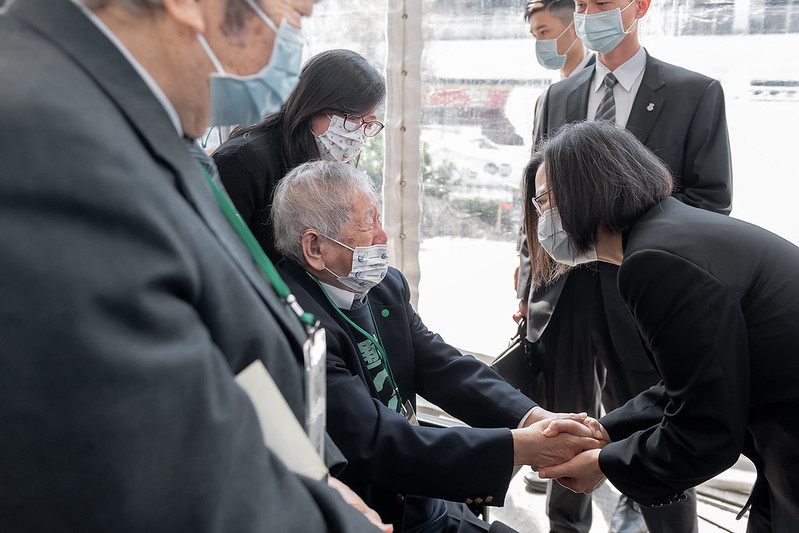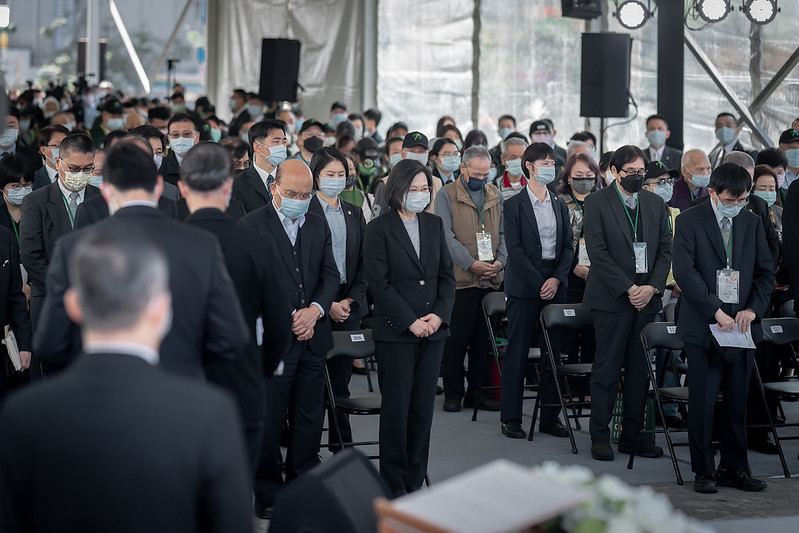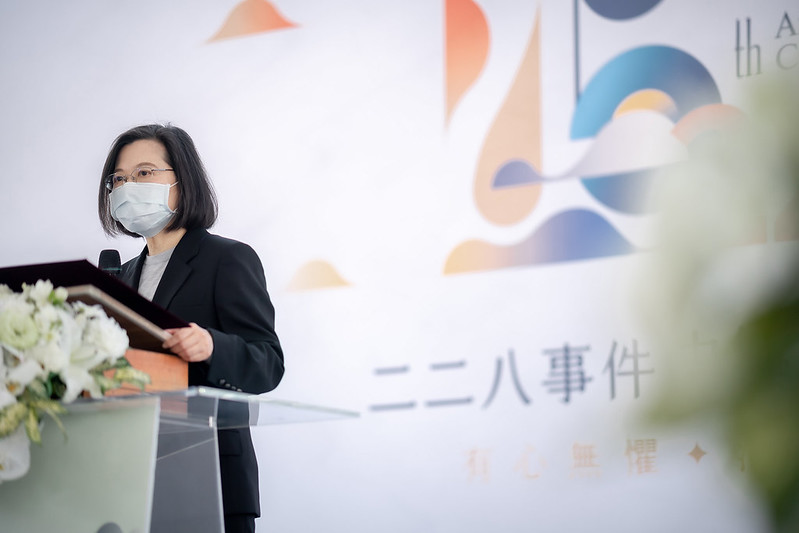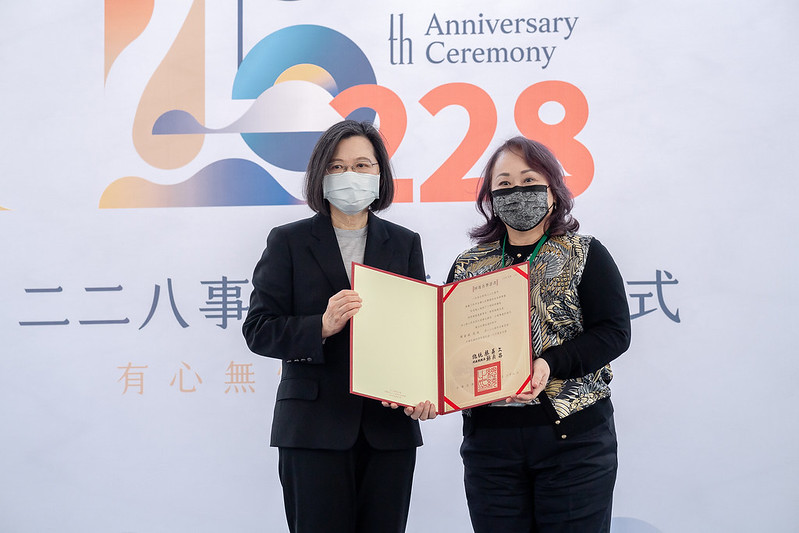News & activities
 News releases
News releases
On the morning of February 28, President Tsai Ing-wen attended the nation's main memorial ceremony marking the 75th anniversary of the 228 Incident. At the event, President Tsai presented a wreath of flowers in memory of the victims of the incident, and thanked the many survivors, family members, and civil society groups who have worked for years to spur government action, giving us their understanding, support, and advice. The president expressed hope that in Taiwan, a stable democracy that has received international acclaim, people from all political parties and walks of life will rationally and maturely move forward together in the direction that most benefits our democratic development, carrying on the important work of transitional justice.
A translation of the president's remarks follows:
Today marks 75 years since the February 28 Incident of 1947.
Here, at Keelung Harbor, is where the troops sent in response to that incident came ashore. On March 8, 75 years ago, those troops suppressed Keelung; the following day brought the start of a political purge and suppression across all of Taiwan.
According to estimates, more than 2,000 people in Keelung fell victim between March 8 and March 16 that year. Among these victims were local leaders as well as students and workers at docks, shipyards, and mines. Many of these people were still very young when they lost their lives.
So we can understand that, for the people of Keelung, 228 Memorial Day really comes on March 8. We can also understand why, over 30 years ago, at a relatively early stage in Taiwan's democratic development, the people of Keelung stepped up their efforts to find out the truth about the 228 Incident.
Over the past few years, in addition to annual memorial events, young people from Keelung have staged dramatic reenactments of scenes from that year, and the Keelung City Government has removed authoritarian symbols from public spaces.
These experiences once again show that transitional justice requires efforts across both government and civil society, and that both the old and the young must work together to pass along this torch from one generation to the next.
Today, 75 years after the 228 Incident, Taiwan's pursuit of transitional justice will soon enter a new phase.
This coming May, the Transitional Justice Commission will submit an overall report on its four years of operation, completing the initial phase of this work. This report will reveal the workings of the authoritarian-era system of persecution that violated human rights. It will also put forward concrete proposals for how Taiwan's society can continue to realize transitional justice and deepen our democracy.
I know many are wondering what next steps we will take in our pursuit of transitional justice after the commission submits its report. I want everyone to know that, once the commission completes its investigative and planning tasks, we will take this work to the next level, with the Executive Yuan responsible for implementation. The relevant legal amendments have already been proposed, and work to facilitate the handover of the Transitional Justice Commission's duties has started.
A few days ago, Premier Su Tseng-chang (蘇貞昌) announced that a board for the promotion of transitional justice will be set up under the Executive Yuan, and that he will personally serve as the board's convener. This board, together with the Executive Yuan's newly established department for human rights and transitional justice, will lead our government's ministries and agencies in continuing to incorporate transitional justice concepts and thinking into administrative practices.
Yesterday was a good example of this, as I joined several veterans of our democracy movement on a visit to the Ankang Reception House in Xindian District, New Taipei City. During the authoritarian era, the facility was used as a detention center where political prisoners were interrogated and tortured to extract confessions, and has now been designated as a historical site of injustice by the Transitional Justice Commission.
The Executive Yuan plans to transfer the Ankang Reception House to the Ministry of Culture's National Human Rights Museum for inclusion in the Jing-Mei White Terror Memorial Park. It will become a base for our efforts to realize transitional justice and promote human rights education, and a place where historical truth can continue to be witnessed and remembered.
I was listening carefully to what Mr. Kao Chao-hung (高兆弘), representing the families of the 228 Incident victims, had to say just earlier about the work of removing authoritarian symbols, including the transformation of Chiang Kai-shek Memorial Hall in Taipei, which has been a focus of many survivors and family members. We will take a prudent approach to promoting this work. Our principle is that a democratic country should no longer use the forms and symbols of authoritarianism to commemorate former presidents.
In addition, the work of rectifying injustices committed by the state, the work of restoring the rights of the victims of political violence, the work of caring for and healing those traumatized by this violence, and the work of opening up and looking into records from that period will be given to the proper ministries or agencies to carry out.
As I have said before, the people should decide how each president goes down in history. The government, however, has a responsibility to expose the systematic persecution of the authoritarian era, as well as a responsibility to let the people fully understand the truth before making objective judgments.
I sincerely hope that in Taiwan, a stable democracy which has received international acclaim, people from all political parties and walks of life can rationally and maturely move forward together in the direction that most benefits our democratic development, carrying on the work of transitional justice.
The international landscape has changed rapidly over the past few days. The whole world continues to watch as the people of Ukraine join together in a struggle to resist invasion and protect their country, their democracy, and their freedom. I believe their commitment to defend their nation's sovereignty, freedom, and democracy has deeply moved everyone around the world who pursues these ideals, and has rallied support for Ukraine across the international community.
Only a united country can face instability and overcome challenges. As president, I have the responsibility to bring Taiwan together and safeguard our democracy, and this has always been my commitment as well.
As we continue to respond to international developments, I want everyone to know that no matter the challenges we face, democracy is our only option, and unity is our only way forward.
Seeking unity does not mean we should forget the past. On the contrary, it means we should remember the path we have traveled, and constantly remind ourselves that the democracy we enjoy in Taiwan should never be taken for granted. Only this way can we cherish what we have today and come together to protect our hard-earned democracy, freedom, and respect for human rights.
It's not easy to persevere on the path of transitional justice and democratic values, which is why I know the spirit shown by these victims who held fast to their convictions is so precious. I want to thank the many survivors, family members, and civil society groups who have worked for years to spur government action, giving us their understanding, support, and advice.
I believe that a nation willing to face its history and reflect on its mistakes is sure to be a strong and resilient nation that can uphold democracy. This is what transitional justice means for Taiwan's democracy, and why it is a mission shared by all Taiwanese. Let us continue our work toward this common goal.
Thank you.






